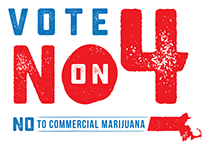The Facts About Question 4
Question 4 is a ballot measure that’s all about commercialization, not legalization. It’s a business plan disguised as a law, designed to enable a billion-dollar-a-year commercial marijuana industry to set up shop all across Massachusetts. Whatever you feel about marijuana, Question 4 is the wrong direction and goes too far.
Question 4 specifically authorizes the sale and promotion of high potency marijuana edibles:
- Pot edibles—THC-infused candy bars, gummies, cookies and soda—are among the fastest growing categories of legalized marijuana and are seen as a key to future expansion in the industry. Almost 50% of all marijuana sales in Colorado, which was the first state to legalize, now come from edibles and concentrates.
- Question 4 allows for pot edibles (and all forms of marijuana) to be marketed and advertised on TV, radio, outdoor billboards and online.
- The measure sets no limit on the amount or potency of marijuana that can be contained in these products. Candy-like edibles are inherently attractive to young kids and pets, leading to accidental ingestion, and their marketing appeals to teens, just like with Big Tobacco.
- Leading Massachusetts public health and addiction treatment experts strongly oppose Question 4, including the Massachusetts Medical Society, Association for Behavioral Healthcare, National Association of Mental Illness of MA and the Massachusetts Hospital Association.
Question 4 will increase the danger from drugged driving while offering no solutions to this growing problem:
- In Washington, the number of fatal car crashes involving drivers using marijuana doubled in the first year following legalization in that state, according to a recent AAA study.
- No “breathalyzer” type technology exists for marijuana, so it’s very difficult for police to effectively prosecute individuals who drive while high on pot. Question 4 completely ignores this problem, including by failing to establish an enforceable legal standard as exists in other states.
- Massachusetts is already dealing with around 7,500 DUI arrests and 130 drunk driving fatalities per year. We don’t need still more impaired drivers on the road.
Question 4 would mean communities and homeowners lose control:
- Question 4 sets no limit on the number of pot shops, growers and other marijuana operators that can open statewide or within any given community. Colorado now has more pot shops than Starbucks and McDonalds combined (over 700 and counting). The city of Denver, which has very nearly the same population as Boston, has 130 pot shops and over 450 licensed marijuana businesses of all kinds.
- If Question 4 passes, medical marijuana dispensaries can transform into retail pot shops and marijuana stores get right to locate in any area that has a dispensary. The measure places deliberately cumbersome new obstacles in the path of cities or towns that want to enact meaningful limits on the number of marijuana shops, pot farms or other pot operations in their community.
- Question 4 guarantees anyone the right to grow up to 12 marijuana plants–a mini pot farm crop worth thousands of dollars—in their house, garage or backyard, even if neighbors object or it’s right next to a school. In Colorado, “homegrows” like these have created a whole new black market for pot that is sold to kids or trafficked out of state.
- Question 4 is packed with pro-pot industry provisions and loopholes, like a special right for marijuana operators to overturn any local rule or state regulation deemed to excessively threaten pot profits.
Still more reasons to vote No on Question 4:
- An extraordinarily strong and diverse coalition of civic leaders and organizations have looked at the facts and concluded Question 4 will be bad for our state. Governor Charlie Baker, Boston Mayor Martin J. Walsh and Congressman Joe Kennedy, III; Cardinal Seán P. O’Malley and the Roman Catholic Bishops of Massachusetts; Attorney General Maura Healey and Suffolk County Sheriff Steve Tompkins; the Massachusetts Business Roundtable and the Massachusetts Municipal Association are among the many urging a “No” vote on Question 4. (See a complete list here.)
- Question 4 is not a solution to racial disparities in our communities or criminal justice system and will likely make matters worse. In Colorado, racial disparities in marijuana arrest rates have increased since that state legalized and the number of such arrests for Latino and African American teenagers is actually higher now than before legalization. Moreover, the commercial marijuana industry there has gravitated into low income neighborhoods and communities of color: one such Denver neighborhood has been saddled with one pot business for every 47 residents.
- Massachusetts has already decriminalized marijuana possession for amounts consistent with personal use and enacted a medical marijuana law. Under current laws, literally no one went to jail in Massachusetts last year based on possessing marijuana for personal use and some 31,000 residents are enrolled in a system that ensures them legal access to medical marijuana for therapeutic use.
- Since becoming the first state to legalize, Colorado has also become the #1 state in the nation for teen marijuana use. Use by teens aged 12-17 jumped by over 12% in the two years since legalization, even as that rate declined nationally.


